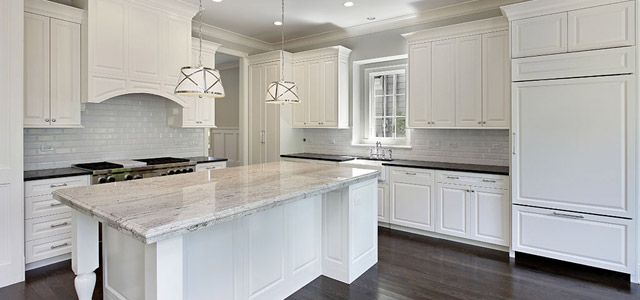The kitchen is the heart of many homes. It’s where food is prepared and served, and where many conversations are had. Bad kitchen designs are also the frustration of many homeowners. It’s an exciting process when homeowners choose to renovate their kitchen, but there are many choices to make. If the renovation is in-depth, the kitchen has to be reconfigured. Appliances must be chosen for function and design. Counters, cabinets, and floors come next along with all of their features. All of these choices influence the look and function of the kitchen for years to come.
A major part of any kitchen design is the counter. The counter is where you prep your meals and look through your mail. For some, it’s even where you eat. People spend hours through the day looking at and using their kitchen counters, so that material should be something beautiful and functional. Two major materials homeowners decide between for their counters are quartz and concrete. While concrete can be custom-poured for a kitchen, it comes with many drawbacks. Here are some reasons why quartz is preferable to concrete counters in your kitchen.
Durability
Quartz is known for being a durable material. It is resistant to scratches, dents, and chips. As long as a professional installs it, quartz is not likely to crack. That means that quartz holds up to daily use of moving bowls and other cooking materials around with no damage. It also holds up in a family setting, where a kid or a pet might climb up and jump around on top of it. Once a homeowner purchase quartz, there’s nothing else to worry about for years to come.
Concrete is nowhere near as durable. Its surface is susceptible to scratching, denting, and chipping. That means the homeowner must be gentle with how items are placed and moved around on the surface, and children and pets must stay away. Concrete is also more likely to crack than quartz, even when installed by professionals. Once it’s cracked, concrete is hard to repair, even for a small crack. It’s so difficult to repair that some people recommend claiming the crack as an aesthetic feature of the counter. You want a counter that is structurally sound, not one that claims a crack as an aesthetic feature.
Stains and Bacteria
Quartz is an antimicrobial material. That means it is a non-porous surface, so bacteria, mold, and mildew can’t get in. While it’s not advisable to leave spills for days without cleaning them, an unnoticed spill can go a few hours and still be wiped away with soap and water without staining the quartz. This keeps it sanitary, easy to clean, and stain free.
Concrete is a porous surface. It’s easy to stain, so if a spill isn’t noticed right away and cleaned up, the counter could be stained. It isn’t even uncommon liquids such as red wine that stain concrete. Everyday liquids such as olive oil and coffee are known to stain concrete counter tops. This means constant interruptions to basic daily cooking to wipe up even a drop spilled immediately. The porous nature of concrete also makes it less sanitary that quartz. Bacteria can grow in the porous material, leading to problems such as mold and mildew.
Maintenance
Quartz is a low-maintenance countertop material. Once it’s in, keep it clean with warm soap and water, and it’s pretty much set. For dried on, surface stains, you might need to soak them with water and liquid detergent for a little while to scrub them off with ease. However, other than basic cleaning, quartz requires no maintenance.
Concrete comes with a maintenance schedule when it’s installed. If you have a busy life with a lot going on, you don’t need another maintenance schedule to keep up with. Quartz is overall more durable, more resistant to stains and bacteria, and less maintenance than concrete. That’s why quartz is preferable to concrete counters in your kitchen.


